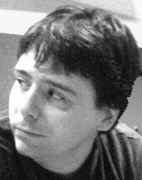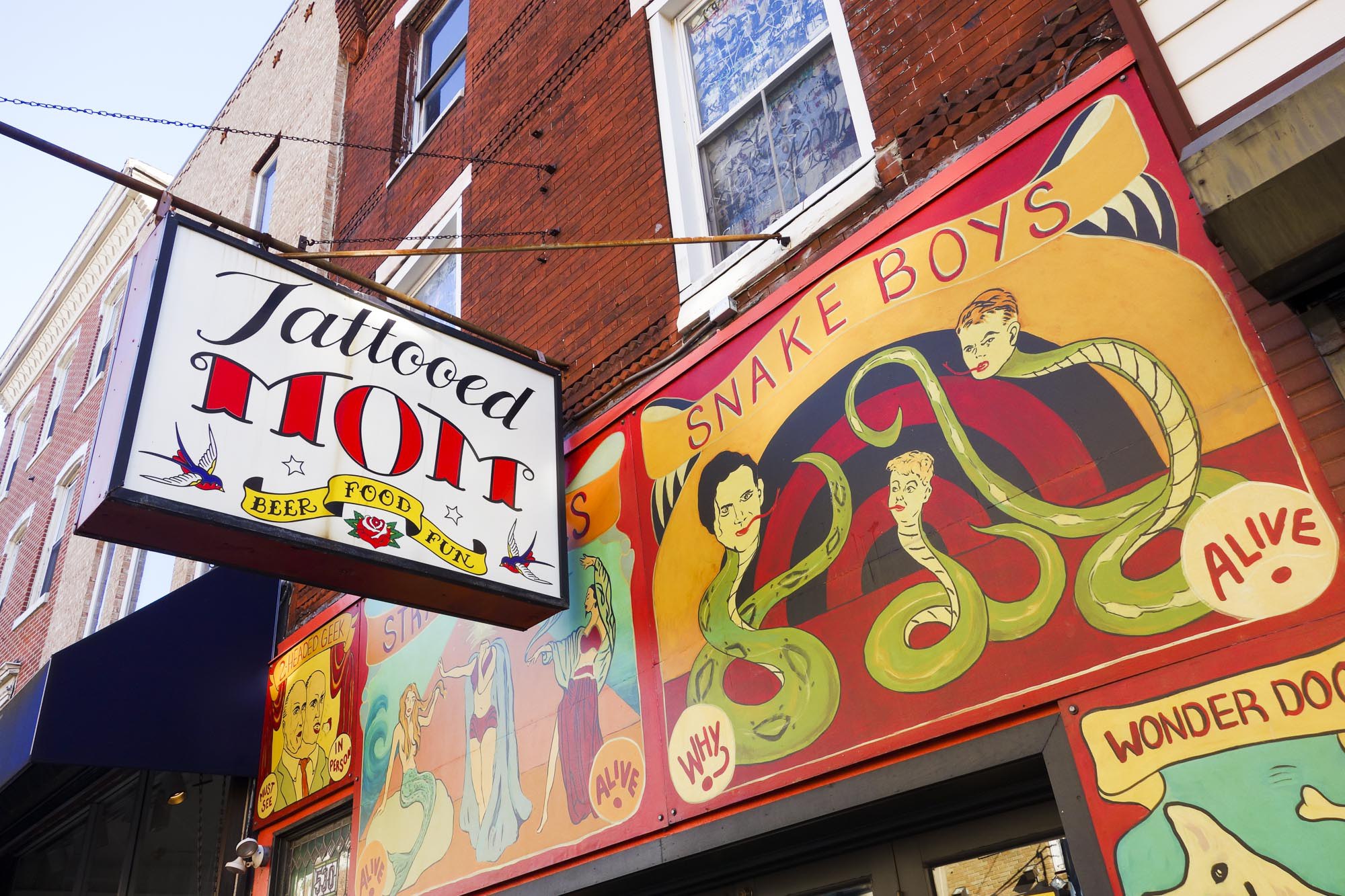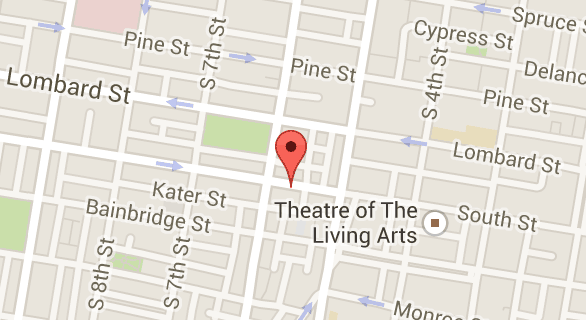A Sunday Evening of Poetry with Ernest Hilbert, Brian Heston, and Therese Halcheid, Hosted by WXPN Radio Personality Keith Kelleher
Sunday, May 24, 7:30PM
Tattooed Mom
530 South St, Philadelphia, PA 19147, (215) 238-9880
Visit the Facebook event page.
 Therése Halscheid’s new book of poems is Frozen Latitudes (Press 53). Other collections include Uncommon Geography, Without Home, Powertalk, and a Greatest Hits chapbook award. Her poems and essays have appeared in many journals, among them The Gettysburg Review, Tampa Review, Crab Orchard Review, and Natural Bridge. By way of house-sitting, she has lived the life of an itinerant writer. Her travels have taken her from a swamp in the Florida Panhandle to the Arctic north of Alaska, where she lived with and taught an Eskimo Inupiaq tribe. See www.ThereseHalscheid.com.
Therése Halscheid’s new book of poems is Frozen Latitudes (Press 53). Other collections include Uncommon Geography, Without Home, Powertalk, and a Greatest Hits chapbook award. Her poems and essays have appeared in many journals, among them The Gettysburg Review, Tampa Review, Crab Orchard Review, and Natural Bridge. By way of house-sitting, she has lived the life of an itinerant writer. Her travels have taken her from a swamp in the Florida Panhandle to the Arctic north of Alaska, where she lived with and taught an Eskimo Inupiaq tribe. See www.ThereseHalscheid.com.
“After Alaska” by Therése Halscheid
for Lisa
She lives in me now, in the north of my chest,
where it is all dark, all winter—
to my ears will come her voice, then to my eyes, this white woman,
then pathways to the tribe she roamed with, to places inside me
where they are hunting and she is gathering and there, a certain arrow,
and there, a stab of certain pain
then to moments other than these,
to nights when my heart is a drum for her dancing
and her movements tell stories, and I feel in her feet
all that was told to me, all that was shared.
When I breathe and the wind blows in a mighty power, my mouth forms
a small opening and she scales the dark throat to leap where
my lip catches the light, that she might sit
and be warmed for awhile─
I felt her once, during an inner storm, as a certain chill ran through,
after my muscles tightened into big cold mountains,
that she was arranging my ribs, arching them,
same as the shelters she spoke of in the icy north of Alaska,
where they shape whalebone over driftwood and pack it with sod.
There is a veined landscape she traverses in the spring
where my blood runs as thawed rivers
and she waits on the sands of myself for the return of the whale,
propped against a white embankment of bones, knees drawn to her chest
as in the way of the Eskimo, at times looking up, reading
the starry pores, the sky of my cloudless skin.
* * *
 Brian Patrick Heston grew up in Philadelphia, Pennsylvania. His poems have won awards from the Dorothy Sargent Rosenberg Foundation, the Robinson Jeffers Tor House Foundation, and the Lanier Library Association. His first book, If You Find Yourself, won the Main Street Rag Poetry Book Award. He is also the author of the chapbook, Latchkey Kids from Finishing Line Press. His poetry and fiction have appeared in such publications as Many Mountains Moving, Rosebud, West Branch, North American Review, Harpur Palate, 5AM, The Spoon River Poetry Review, Poet Lore, South Carolina Review, and River Styx. He is a Ph.D. candidate in Literature and Creative Writing at Georgia State University.
Brian Patrick Heston grew up in Philadelphia, Pennsylvania. His poems have won awards from the Dorothy Sargent Rosenberg Foundation, the Robinson Jeffers Tor House Foundation, and the Lanier Library Association. His first book, If You Find Yourself, won the Main Street Rag Poetry Book Award. He is also the author of the chapbook, Latchkey Kids from Finishing Line Press. His poetry and fiction have appeared in such publications as Many Mountains Moving, Rosebud, West Branch, North American Review, Harpur Palate, 5AM, The Spoon River Poetry Review, Poet Lore, South Carolina Review, and River Styx. He is a Ph.D. candidate in Literature and Creative Writing at Georgia State University.
“The Third Rail” by Brian Heston
And there was Tom Boyle. He worked at Fox Foundry
before they shut the doors. He liked to get lit
at Fifteenth Round. After his shift, he’d meet up
with Franny Shaw and Stan Rhutkowski. They’d pound
shots of Jamison then wash it down with Schlitz
and Bud. They coughed up black stuff even as young men.
Emphysema would be in Franny’s and Stan’s futures—
Look, a Piping Plover just flew into those leaves.
I got a book to identify the birds. You didn’t get so many
years ago. These parks were shittier then, the grass
sickly from garbage—Anyway, Tom was built
like a fireplug. He never met an argument he couldn’t
settle. All the Boyles were cops, which kept him out
of most trouble. Sometimes, he just didn’t want to stop,
so when last call came, he told the others about a joint
in Old City. “It’s got broads jumping on the bar
and flashing their tits,” he said. Just one of the many tales
he told. It was early, and they were all young men.
So they staggered their way to Front and Girard
through vacant streets, singing to pass the time: Dream On,
mostly. Other times, Piano Man. The station agent
was snoozing when they arrived, so they jumped
the turnstile. A couple bulbs on the platform lamps
were out. Everything was blurry in the murky light.
You see, Tom had to go something awful. “Like a race horse,”
Franny said. “So much he could taste it,” added Stan.
They started whispering rain, river, and beer, beer, beer
until Tom could take no more. He walked to the platform’s
edge and unzipped. Franny and Stan fell over themselves,
laughing. When Tom let loose his yellow stream,
he sighed like a contented man. Stan said he could see
through the dark that he was grinning. That’s when
it happened. Real quick. Like lightning, but instead
of the sky, it came from the tracks, up through Tom’s
unbroken rope of piss. It shivered him for seconds,
but to Franny and Stan, it was minutes. He was still
holding his dick when the current finally chucked him off.
Like a marionette with clipped strings, Tom collapsed.
Franny and Stan stood over him with their hands dug
in their pockets. The Emphysema took them last year.
* * *
 Ernest Hilbert’s debut collection Sixty Sonnets (2009) was described by X.J. Kennedy as “maybe the most arresting sequence we have had since John Berryman checked out of America.” His second collection, All of You on the Good Earth (2013), has been hailed as a “wonder of a book,” “original and essential,” an example of “sheer mastery of poetic form,” containing “some of the most elegant poems in American literature since the loss of Anthony Hecht.” His third collection, Caligulan, will be published in hardcover in September of this year. He works as a rare book dealer at Bauman Rare Books in Philadelphia. He also works as an opera librettist and teaches courses in the art of the opera libretto and verse satire at Western State University of Colorado’s Master of Fine Arts program. His poems have appeared in The New Republic, Yale Review, American Poetry Review, Harvard Review, Parnassus, Boston Review
Ernest Hilbert’s debut collection Sixty Sonnets (2009) was described by X.J. Kennedy as “maybe the most arresting sequence we have had since John Berryman checked out of America.” His second collection, All of You on the Good Earth (2013), has been hailed as a “wonder of a book,” “original and essential,” an example of “sheer mastery of poetic form,” containing “some of the most elegant poems in American literature since the loss of Anthony Hecht.” His third collection, Caligulan, will be published in hardcover in September of this year. He works as a rare book dealer at Bauman Rare Books in Philadelphia. He also works as an opera librettist and teaches courses in the art of the opera libretto and verse satire at Western State University of Colorado’s Master of Fine Arts program. His poems have appeared in The New Republic, Yale Review, American Poetry Review, Harvard Review, Parnassus, Boston Review
, Verse, New Criterion, American Scholar, and the London Review as well as a number of anthologies, including the Swallow Anthology of New American Poets (2009), and two Penguin anthologies, Poetry and Literature (2011).
“Caligulan” by Ernest Hilbert
Your bank calls. Events begin to register
Some unwelcome forecast. The dreamy nurses
Switch to Goodfellas on the overhead TV.
The omens come and signs are sinister.
Texts go unreturned. You’re out of coffee.
The Olympian Jupiter curses.
In sleep, a great toe kicks you back to earth.
The slaves stage a play about the Under-
World. The smoke alarm fails, and your computer crashes.
Your favorite gladiator is lashed
For theft, lightning blackens your temple, thunder
Sinks your song, because, like the day of birth,
The day you’ll wake and have your death is set,
But just hasn’t, just hasn’t happened yet.



